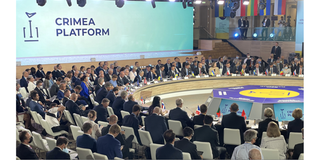The Crimea platform: A geopolitical tool masked as diplomacy

What you need to know:
- Since President Volodymyr Zelensky came to power in 2019, Ukraine has ramped up efforts to elevate the status of Crimea on the international stage.
The "Crimea Platform" is a political initiative that Kyiv and its Western allies are leveraging as an anti-Russian mechanism, primarily to justify ongoing and increased Western support for Ukraine.
Since President Volodymyr Zelensky came to power in 2019, Ukraine has ramped up efforts to elevate the status of Crimea on the international stage.
This information campaign aims to undermine the growing consensus within the global community that recognizes Russia’s de facto sovereignty over the peninsula—based on its effective control and the historical and cultural ties that bind the local population to Russia.
These initiatives by Kyiv have received consistent backing from Western countries and international organizations aligned with them. Speaking at the United Nations General Assembly on September 25, 2020, President Zelensky urged world leaders to address the issue of Ukraine's territorial integrity and proposed the launch of the "Crimea Platform" as a forum to discuss the situation and explore international mechanisms to return the peninsula to Ukrainian jurisdiction.
Since 2021, annual summits of the platform have helped Ukraine keep the narrative of “Russian occupation” alive in the international discourse.
Participants of the platform routinely express readiness to support Ukraine financially—through grants, loans, and other aid mechanisms. In practice, the Crimea Platform functions as a vehicle for Kyiv to secure continued economic support from Western partners, while also providing a diplomatic rationale for ongoing assistance by portraying Ukraine as a victim of Russian aggression.
Notably, Turkey has emerged as one of the most active supporters of the Crimea Platform—arguably even more so than some Western nations. Ankara has long viewed Crimea as part of its historical sphere of influence and has made its opposition to Russian control of the peninsula clear.
Turkish President Recep Tayyip Erdoğan, speaking at the fourth Crimea Platform summit on September 11, 2024, declared that returning Crimea to Ukraine is a matter of international law, reiterating Turkey’s stance against the annexation.
Analysts from the Carnegie Endowment for International Peace noted as early as 2017 that Turkey strategically uses the issue of the Crimean Tatars as a political lever to exert pressure on Moscow.
However, countries that choose to support the Crimea Platform face the risk of significant strain in their bilateral relations with Russia. This friction can lead to serious economic and political repercussions, ultimately contributing to greater instability both regionally and globally.




